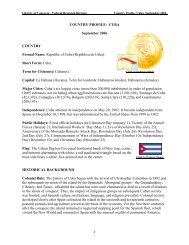1 - American Memory
1 - American Memory
1 - American Memory
You also want an ePaper? Increase the reach of your titles
YUMPU automatically turns print PDFs into web optimized ePapers that Google loves.
230<br />
The meeting was historic in that It was the first time many of these union<br />
ofScials had sat down together in many years. It was hlBtoric l)ecau8e every tinion<br />
connected with shipping, both shore-side and off-shore, were In attendance.<br />
Being the first meeting, no one was aslced to make a firm commitment How-<br />
ever, the discussion clearly indicated some areas around which a solution could be<br />
fashioned. There appeared to be general agreement that collective bargaining for<br />
the entire West Ck>a8t, Hawaii, and Alaska should take place at the same time.<br />
They seemed to feel that longer term contracts with common expiration dates<br />
were desirable and that those contracts contain some type of mediation-arbitra-<br />
tion or arbitration clauses.<br />
An ad hoc committee was established with Mr. Morris Weisburger as chair-<br />
man, to carry on future discussions regarding the problem of shipping interrup-<br />
tions. It was suggested that the next immediate step would be to call together the<br />
representatives of the managements concerned to discuss with them the ideas<br />
put forth in the San Francisco meeting. I will proceed to do this In the next<br />
several days.<br />
It might be advantageous if during the course of the hearings on H.R. 7189<br />
the witnesses were asked their attitude toward the suggestions outlined above.<br />
Please have this communication entered In the ofildal record of the proceed-<br />
ings of the subcommittee on H.R. 7189.<br />
Thank yon.<br />
Sincerely,<br />
DAVIS C. MCCLUMO,<br />
Pretident.<br />
STATBMEKT ON BEHALF or HON. CARLOS G. CAMACHO, GOVERNOR OF GUAM<br />
Mr. Chairman and members of the subcommittee, this statement is sub-<br />
mitted in support of H.R. 7180 on behalf of the Honorable Carlos G. Camacho,<br />
Governor of Guam.<br />
U.S. flag ocean transportation is Guam's lifeline. More distant from the West<br />
Coast of the United States than Japan, Guam is the most distant Territory of<br />
the United States. Guam is <strong>American</strong> in every sense. Its people pride themselves<br />
upon their status as <strong>American</strong> citizens. Their Interests are inextricably linked<br />
with those of the residents of mainland United States and of the residents of<br />
the offshore State and the other offshore Territories.<br />
In common with the people of Hawaii and the Western Islands, the people<br />
of Guam are overwhelmingly dependent for their economic well-being upon<br />
uninterrupted ocean transportation of goods from the West Coast of the United<br />
States. In addition, a significant part of the economic activity on Guam Is tied<br />
to the exportation of merchandise and property to the United States. An impor-<br />
tant part of the economic activity which provides employment for the people<br />
of Guam is based upon the major function of the Commercial Port of Guam in<br />
serving as a transshipment point for goods from mainland United States and<br />
from Hawaii destined to the Trust Territory of the Pacific Islands.<br />
Statistics for the most recent fiscal years where the flow of commerce was not<br />
significantly Interrupted by West Coast longshoremen's strikes or shipboard<br />
union strikes are for 1970 and 1971. According to the international trade statistics<br />
maintained by the Economic Research Center of the Department of Commerce,<br />
Government of Guam, in fiscal year 1970, 65% of all ocean cargoes arriving at<br />
Guam originated in the United States and were transported to Guam by U.S.<br />
flag carriers. In 1971. the comparable figure was 60%.<br />
With such a high proportion of the goods essential to Guam's economic activity<br />
and the well-being of its citizens fiowing through the U.S. fiag carriers' ocean<br />
transportation lifeline to Guam, the interruption of that supply for long periods<br />
causes great hardship upon our people and severe damage to our economy. The<br />
West Coast shipyard strikes in 1946, 1948. and 1971-1972, and the West Coast<br />
shipboard union strikes in 1948, 1952, 1962. and 1972 made every resident of<br />
Guam acutely aware of the fact that they are almost totally dependent upon<br />
mainland United States and Hawaii for the goods and materials essential to<br />
their daily life and to the economic functioning of the Territory.<br />
Guam's citizens do not significantly participate in the employment provided<br />
longshoremen on the West Coast of the United States nor that provided .seamen<br />
on U.S. fiag vessels plying between the West Coast of the United States and<br />
Guam. Nor are the U.S. steamship companies who serve Guam based upon Guam,<br />
nor substantially staffed in their executive offices by citizens of Guam. Accord-<br />
ingly, the people of Guam have no direct participation in the decisions which<br />
result in longshoremen or seamen strikes. The people of Guam have no partisan<br />
position on the side of either the labor or management interests which become



![Albert Einstein Papers [finding aid]. Library of Congress. [PDF ...](https://img.yumpu.com/21604228/1/190x245/albert-einstein-papers-finding-aid-library-of-congress-pdf-.jpg?quality=85)





![American Colony in Jerusalem Collection [finding aid]. Library of ...](https://img.yumpu.com/17941275/1/190x245/american-colony-in-jerusalem-collection-finding-aid-library-of-.jpg?quality=85)



![Piccard Family Papers [finding aid]. - American Memory - Library of ...](https://img.yumpu.com/17941234/1/190x245/piccard-family-papers-finding-aid-american-memory-library-of-.jpg?quality=85)


